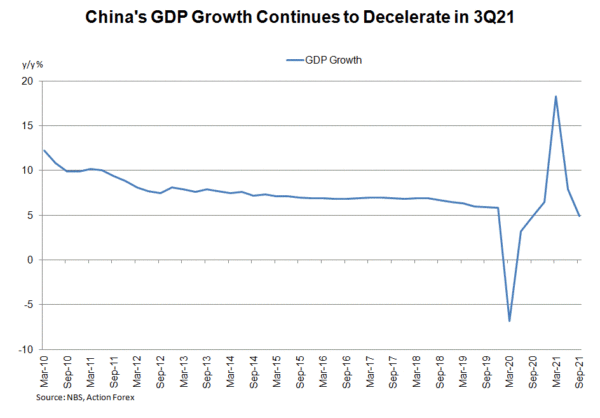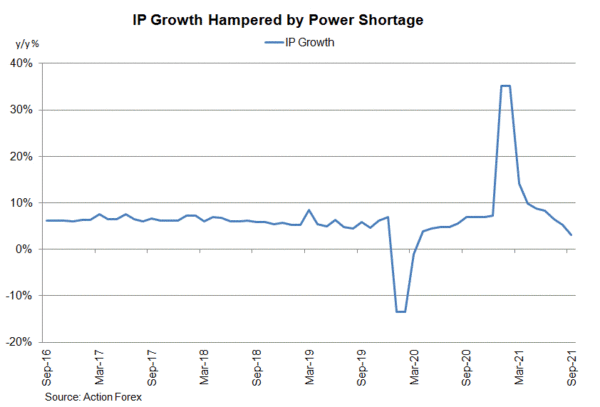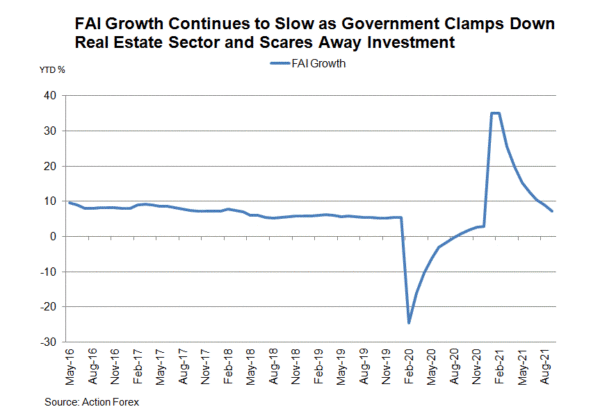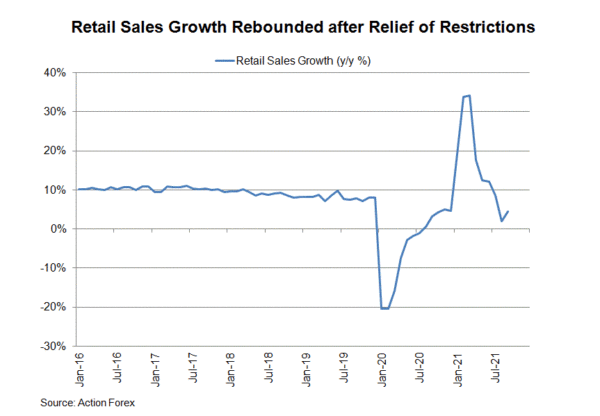China’s economy falters. GDP expanded +4.9% y/y in 3Q21, weaker than consensus of +5% and +7.9% in the prior quarter. From a quarter ago, the economy climbed only an annualized +0.8%. Power shortage, policy change, uncertainty about the pandemic were to blame for the disappointment. Without quick fixes to these constraints, we expect the worst the yet to come.
Industrial production grew +3.1% y/y in September, missing consensus of +3.8% and significantly less than August’s +5.3%. The downside surprise was mainly attributed to power shortage and supply chain disruption. The government has already urged for higher coal production and approved increase in electricity price, in order to alleviate power shortage. We doubt if this could be of much help as electricity consumption should accelerate rapidly during winter season. Some ports remained closed due to the pandemic, prolonging the problem of chip shortages. China’s heavy reliance on chip imports (90%) could eventually defeat its industrial sector, in particular equipment, automobiles and telecommunication devices, in the long-term.
Urban fixed asset investment (FAI) expanded +7.3% y/y in the first 9 months of the year, also weaker than +7.8% in first 8 months. FAI contracted -1.7% y/y in the month of September, following mild growth of +0.7% in the prior month. Looking into details, manufacturing investment expanded +10.2% y/y in September, accelerating from +6.2% in August. Property investments, however, dropped -3.5% y/y, following mild increase if +0.6% in August. This also marks the first contraction since February 2020. Infrastructure investment declined further, down -3% y/y in September, after a -3.4% fall a month ago.
The only good news came from retail sales, which rose +4.4% y/y, beating consensus of +3.5% and +2.5% in August. On a monthly basis, retail sales rebounded +5.6% m/m in September, following a -3.3% contraction in the prior month. The strength can be attributed to relaxation of pandemic-related restrictive measures in late-August. Note that catering sales increased +3.1% y/y in September, after contracting -4.5% a month ago. Meanwhile, online goods sales remained firm, with growth accelerating to +10.1% y/y, from +5.1% in August.
China’s GDP growth is in deceleration. We are not too optimistic about the growth in 4Q21 as factors constraining third quarter growth remain in play. A colder-than-usual winter will increase residents’ electricity consumption. Xi’s populist approach to consolidate his political influence suggests that residents’ demand is likely prioritized above industrial activities’ demand for electricity. Given that the overall electricity supply will remain tight in the months ahead, it is likely for industries/factories to continue to suffer from power disruption.
It is just the beginning of CCP’s reform on various sectors, in particular the real estate sector and technology sector. As the government attempts to deleverage the real estate sector, it is difficult for the PBOC to ease its monetary policy to stimulate growth. Indeed, we now expect a RRR reduction is less likely than before. Meanwhile, the government’s erratic moves lack transparency, greatly demotivating private investment both domestically and abroad. Worse still, Evergrande’s debt problem is just the tip of the iceberg. We are concerned about the spillover effect from Evergrande although the PBOC has assured the risk is limited.
